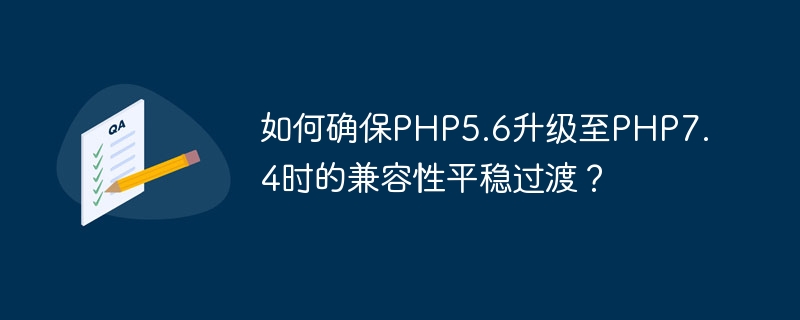Home > Article > Backend Development > How to ensure smooth transition of compatibility when upgrading PHP5.6 to PHP7.4?
How to ensure smooth transition of compatibility when upgrading PHP5.6 to PHP7.4?
- WBOYOriginal
- 2023-09-05 11:46:561438browse

How to ensure smooth transition of compatibility when upgrading PHP5.6 to PHP7.4?
With the continuous development of PHP technology, PHP7.4 has been released, and many people are beginning to consider upgrading their applications from PHP5.6 to PHP7.4. Although PHP7.4 brings many improvements and optimizations, you may encounter some compatibility issues when upgrading. Before proceeding with the upgrade, we need some strategies and tips to ensure a smooth transition of compatibility. This article will share some methods to help you navigate the process.
- Understand the new features and changes of PHP7
First of all, you need to understand the new features and changes of PHP7 compared to PHP5.6. PHP7 introduces some important improvements, such as faster performance, better memory management and type hints, while deprecating some obsolete features. Learning more about these changes will help you better understand issues you may encounter during the upgrade process and provide guidance on how to resolve them. - Use PHP7 upgrade detection tools
Before starting the upgrade, you can use some PHP7 upgrade detection tools to scan your application and identify potential compatibility issues. These tools can scan and report usage of deprecated features in your application, or check for code that is incompatible with PHP7. By using these tools, you can discover and solve potential problems earlier and reduce difficulties during the upgrade process. - Gradual upgrade
For a smooth transition, you can consider the gradual upgrade method. In other words, you can first upgrade your application from PHP5.6 to PHP7.0, and then gradually upgrade to PHP7.1, PHP7.2, and so on, until you finally reach PHP7.4. Such a step-by-step upgrade method allows you to gradually resolve compatibility issues and ensure proper operation on each PHP version. - Fix potential problems
During the upgrade process, you are likely to encounter problems with some deprecated features, or the behavior of some functions has changed. Once these problems are discovered, you need to fix the code to make it compatible with the new version of PHP7.4. For example, you might need to update function calls in legacy code or replace deprecated functionality. Make sure every potential issue is analyzed and fixed in detail to ensure the entire application runs well on PHP7.4.
The following is a simple example showing some compatibility issues and solutions between PHP5.6 and PHP7.4:
// PHP5.6代码
function getName()
{
return "John Doe";
}
// PHP7.4代码
function getName(): string
{
return "John Doe";
}In this example, we assume During the upgrade process, you will encounter a problem with the return type of a function. In PHP5.6, the return type of a function is implicit, and the getName function can return any type of value. However, in PHP7.4, we can explicitly specify the return type as string. Therefore, during the upgrade process, you will need to modify your code to accommodate the new return type.
Summary:
Upgrading the PHP version is a necessary process to maintain the advancement of our applications in technological development. However, such an upgrade process may face some compatibility issues. By understanding new features and changes, using upgrade detection tools, gradually upgrading, and fixing potential issues, we can ensure a smooth transition from PHP 5.6 to PHP 7.4 compatibility. Before upgrading, allow time to test and resolve compatibility issues to ensure your application will run properly on the new PHP version.
The above is the detailed content of How to ensure smooth transition of compatibility when upgrading PHP5.6 to PHP7.4?. For more information, please follow other related articles on the PHP Chinese website!

